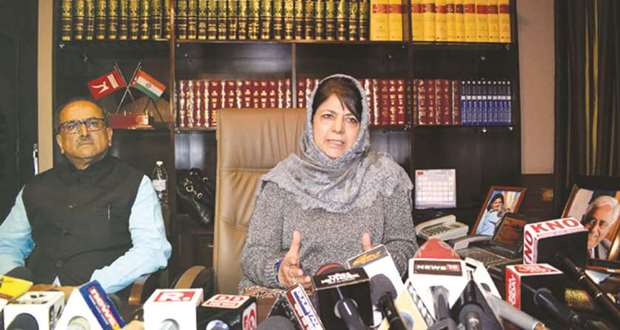India yesterday appointed a special representative to pursue talks in Jammu and Kashmir aimed at easing a decades-long conflict that has claimed thousands of lives.
It is the first such initiative taken by Prime Minister Narendra Modi to address tensions in the state since his Bharatiya Janata Party took power in 2014.
Dineshwar Sharma, a former chief of the Intelligence Bureau with experience of insurgencies in India’s northeast, has been named special envoy to open talks with Kashmir’s various factions.
“As a representative of government of India,...Sharma will initiate a sustained interaction and dialogue to understand legitimate aspirations of the people of Kashmir,” Home Minister Rajnath Singh told reporters in New Delhi.
Similar efforts in the past to resolve the intractable conflict have failed.
For decades rebel groups have fought soldiers deployed in the northern state in a bloody insurgency, demanding independence or a merger with Pakistan.
There is no suggestion Pakistan will be involved in this latest effort at peace in Kashmir.
The government has so far shunned talks with Kashmir’s main separatist alliance, the All Parties Hurriyat Conference.
Asked if Sharma would talk to the separatists, Singh said he would be free to “talk to whoever he wants to”.
Singh said the move was to carry forward the “the conviction and consistency” in the government’s Kashmir policy.
He said Modi had talked to all political parties on what could be done to find a solution to the Kashmir problem.
“People told us that the dialogue process should be started. We are doing this,” Singh said.
In July, the National Investigation Agency arrested seven Hurriyat members on charges of receiving funds from Pakistan-based militant groups to wage attacks. The Hurriyat is an umbrella group of political and religious groups fighting for Kashmir’s secession from India.
Critics have accused India – which maintains a standing force of half a million soldiers in Kashmir – of extending an olive branch while refusing to loosen its grip on the state.
The army this year launched “Operation All-out” to hunt insurgents fighting against Indian rule in the state.
At least 166 militants and 59 security personnel have died so far this year.
Modi – whose government has not engaged with separatists since 2014 – struck a conciliatory note in August, saying the state needed a healing touch “not bullets and abuses”.
Chief Minister Mehbooba Mufti welcomed the move saying “dialogue is a necessity of the hour and the only way to go forward”.
She hoped that all the stakeholders including the separatists would come forward with a positive response to the development.
Asked whether the appointment of the interlocutor would have a bearing on the NIA investigations underway against the separatists, the chief minister said: “Security is a separate issue and the political process is a separate issue.”
Omar Abdullah, the former chief minister of Jammu and Kashmir and an outspoken government critic, too welcomed the initiative but reserved judgment until talks had begun.
“One can’t get everything, so for now we’ll take what we can get,” he posted on his Twitter account.
“More important than the person is the mandate and absence of pre-conditions.”
However the Hurriyat Conferences did not react immediately.
Senior Congress leader and former finance and home minister P Chidambaram, who had also announced a similar exercise in 2010, said the government has admitted that its “muscular approach” has failed in the state.
“From no-talks to talks-with-all-stakeholders is a major victory for those who had strongly argued for a political solution in Jammu and Kashmir. With the appointment of an interlocutor, I hope the government has finally admitted muscular approach has failed.”

Jammu and Kashmir Chief Minister Mehbooba Mufti addresses a press conference in Srinagar where she welcomed the central government’s move to hold talks with all stakeholders in the state. Also seen is Deputy Chief Minister Nirmal Singh.
